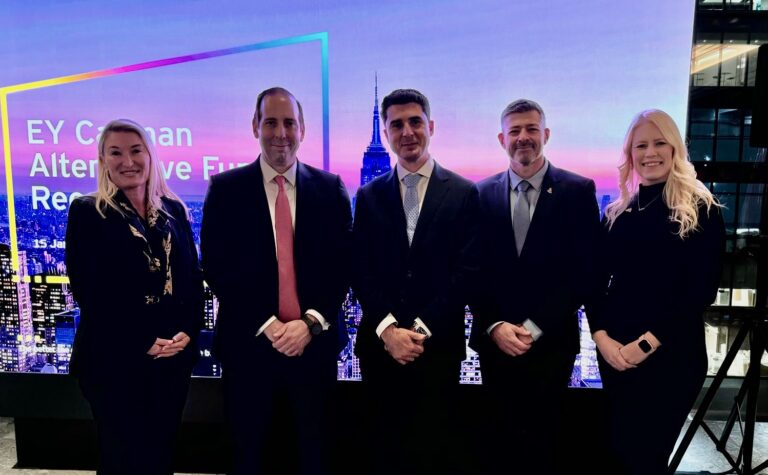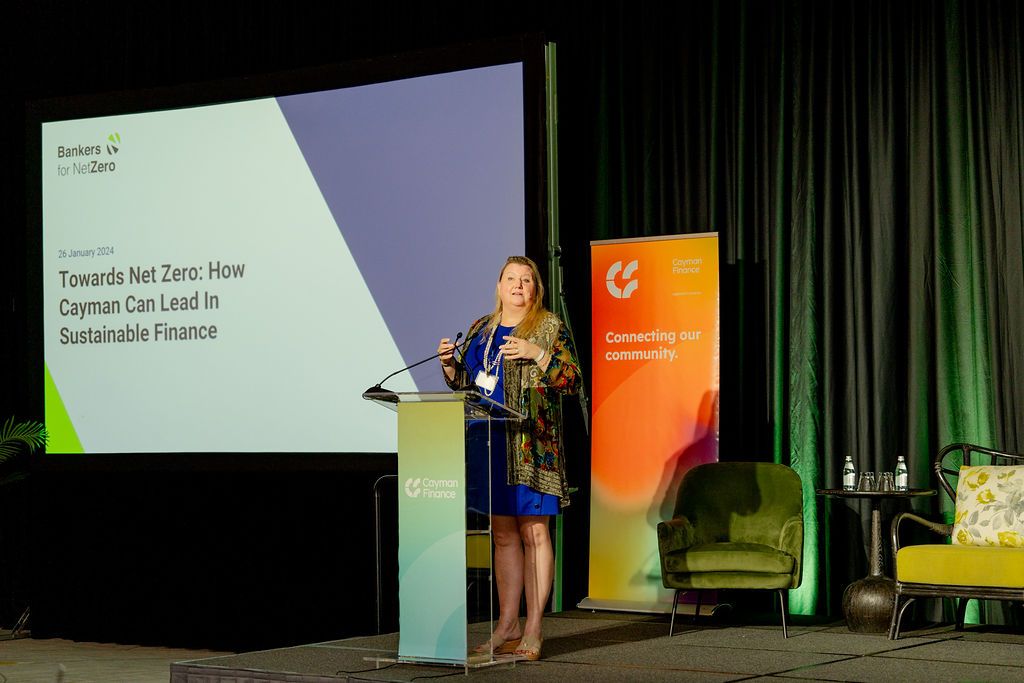
EY’s Tiffany Norris-Pilcher, Jeff Short and Marco Calleja with Cayman Finance CEO Steve McIntosh and Associate Director for Funds Samantha Widmer.
Cayman Finance CEO Steve McIntosh has said the Cayman Islands will shift its focus from regulation to innovation to remain the leading alternative funds domicile.
Speaking at the EY Cayman Alternative Fund Reception at the offices of EY LLP in New York on 15 Jan, McIntosh highlighted Cayman’s regulatory advancements over the past decade, noting how the financial services industry association had been actively engaged in regulatory initiatives to maintain the highest compliance standards while finding solutions that work for both regulators and the industry.
He emphasised that new legislation to comply with evolving international regulations solidified Cayman’s reputation, but had also taken up a lot of the public sector’s resources during that time.
“That bandwidth is now very much freed up to focus on things like innovation, which I think is very important for us to adopt as a jurisdictional strategy,” McIntosh said.
Speaking in front of 150 guests, including EY partners and clients, the Cayman Finance CEO highlighted the impressive growth of the Cayman Islands’ funds sector, which now boasts more than 30,000 alternative funds managing more than $8.2 trillion in net assets.
To remain the leading fund domicile, he said, “Cayman will continue to enhance efficiencies as a jurisdiction, ensure that services are easier and faster to use, and respond to client demand for new asset classes, thematic funds or innovative investment structures.”
McIntosh said the Cayman Islands is already seeing increasing allocations to digital assets, a crossover between insurance and funds, and interest in tokenised funds.
Meeting with law firms, prime brokers, managers and clients in New York helps the association to get the feedback needed to further refine Cayman’s fund offering, he added.
EY’s global alternative funds survey
McIntosh’s remarks reflected the results, cited at the event, of the 2024 EY Global Alternative Fund Survey of more than 400 alternative fund managers and institutional investors.
According to the recently released survey report, alternative fund managers view diversification as essential for expanding capital inflows and sustaining growth. This could include exploring new asset classes, such as digital or crypto assets, thematic funds (e.g. green funds), and different investment structures, such as semi-liquid vehicles.
Global alternative assets under management have grown at a robust rate over the last six years reaching US$19.5 trillion by the end of 2024, driven largely by the growth of private markets and the expansion of private market platforms that helped raise equity and debt for private companies.
Alternative asstes are projected to reach US$29.2 trillion by 2029, supported by the accelerated democratisation of private markets, enhanced access for individual investors and growing demand for portfolio diversification from institutional investors, the report noted.
Surveyed alternative fund managers said they are prioritising access to ultra-high-net-worth and high-net-worth clients, who currently make up 20% and 19% of the investor base, respectively. This segment is seen as a major growth frontier, especially in North America, where 32% of firms identify it as their top strategic priority. A significant minority (11%) also view accessing retail or mass affluent capital as a leading priority.
However, the report highlighted that while this democratisation presents significant growth opportunities, it also brings challenges related to operational complexity, investor education, and profitability.
In the survey, institutional investors reported high satisfaction with alternative asset classes, particularly credit, secondaries, and equity hedge funds, during 2023 and the first half of 2024.
Institutional investor allocations are most concentrated in private equity (22%), real estate (16%), credit (14%), and real assets and infrastructure (12%).
Infrastructure and private equity are the most favored asset classes, with 50% of investors planning to increase infrastructure allocations over the next three years.
McIntosh was joined by Cayman Finance Associate Director for Funds & Capital Markets, Samantha Widmer as well as a number of EY’s partners, including EY Cayman Country Managing Partner, Jeffrey Short, and EY Cayman Wealth & Asset Management Partner and Regional Emerging Manager Platform Leader, Marco Calleja, who moderated the fireside chat with McIntosh, as well as EY Bahamas Country Managing Partner and EY Regional Wealth & Asset Management Leader, Tiffany Norris-Pilcher.


